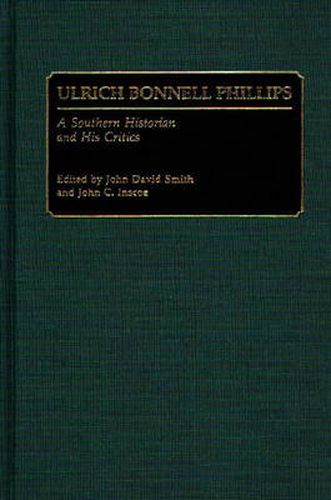Readings Newsletter
Become a Readings Member to make your shopping experience even easier.
Sign in or sign up for free!
You’re not far away from qualifying for FREE standard shipping within Australia
You’ve qualified for FREE standard shipping within Australia
The cart is loading…






One of the most controversial historians of the American South, Ulrich Bonnell Phillips, has been the object of intense scholarly interest for nearly seventy-five years. His contributions to our knowledge of the social and economic aspects of slavery–along with his well-known racial and class biases–have been discussed extensively. This anthology represents the best work on Phillips published between 1913 and 1986.
The senior editor’s introduction examines Phillips’ role in the transition to the new social and economic approach that characterizes contemporary historiography. Twenty-six essays and excerpts by recognized authorities assess various aspects of Phillips’s writings and career, including his background and training, regional and racial prejudices, methodology, and the historical genres in which he worked. A brief interpretive introduction prefaces each chapter. A chronological listing of the critical literature on Phillips completes the volume. Reflecting the vast scope of Phillips’s contributions and his pervasive influence in the field, this collection is pertinent to studies in southern history, historiography, Afro-American history, and the history of race relations.
$9.00 standard shipping within Australia
FREE standard shipping within Australia for orders over $100.00
Express & International shipping calculated at checkout
One of the most controversial historians of the American South, Ulrich Bonnell Phillips, has been the object of intense scholarly interest for nearly seventy-five years. His contributions to our knowledge of the social and economic aspects of slavery–along with his well-known racial and class biases–have been discussed extensively. This anthology represents the best work on Phillips published between 1913 and 1986.
The senior editor’s introduction examines Phillips’ role in the transition to the new social and economic approach that characterizes contemporary historiography. Twenty-six essays and excerpts by recognized authorities assess various aspects of Phillips’s writings and career, including his background and training, regional and racial prejudices, methodology, and the historical genres in which he worked. A brief interpretive introduction prefaces each chapter. A chronological listing of the critical literature on Phillips completes the volume. Reflecting the vast scope of Phillips’s contributions and his pervasive influence in the field, this collection is pertinent to studies in southern history, historiography, Afro-American history, and the history of race relations.